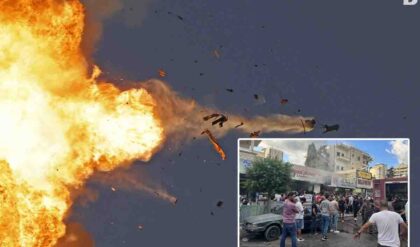It is only fitting that the long-awaited deliveries of both Israel’s and Saudi Arabia’s newest jet fighters are occurring at the same time. For many decades, the US has carefully armed the two foes heavily, always giving Israel the qualitative advantage. This continues to today as the IAF will not only be the first foreign operational user of the F-35, it will also be the only country to get the jet in the Middle East. Turkey, a NATO ally, will be the closest country geographically to also operate the type. Still, Saudi Arabia did not get any sort of consolation prize. Far from it in fact. They are receiving the most advanced iteration of the feared F-15 Eagle the world has ever seen, the F-15SA.
After a short delay due to weather at Cameri Air Base in Italy, Israel’s first two F-35I Adirs landed at Nevatim Air Base in Israel yesterday evening. They were greeted by the highest ranks of the Israeli military, industry and government leadership—including Prime Minister Netanyahu. Even outgoing US Secretary of Defense Ashton Carter and President of Lockheed Martin Marillyn Hewson were on hand to greet the fighters.
Although the event, which was a major milestone for the F-35 program, was overshadowed by President elect Trump’s negative remarks about the program just a day earlier, it still was a highly publicized and fairly glitzy affair.
At the arrival ceremony Major General Amir Eshel, the commander of the IAF, proclaimed that “Today, the fifth generation revolution begins. The Adir is about to become a powerful accelerator for the entire IAF… We plan on leveraging our systemic abilities to new heights in attack and defense. Our aerial force will be much deadlier, combined and more relevant than ever.” The general continued, “Today, a fascinating meeting between man and machine begins, between our excellent pilots and maintenance personnel and the forefront of flight technology. The jet will become exceedingly ‘White and Blue’ in its operation and systems. Each Adir will be an awesome attack machine, an information and control center that will operate successfully in the face of dangerous threats in ways completely different than those we are familiar with.”
Prime Minister Netanyahu also remarked that “The Adir stealth fighters and pilots will be able to operate in every arena, near and far. Our goal is to obtain supremacy in every theatre: in the air, in the sea, on the ground and in the cyber arena. We build our force and sharpen our abilities in defense, attack, deterrence and decision. The Adir jets will strengthen these abilities.”

Israel says the jet will be operational in just one year and that 50% of all pilot training will happen in simulators. This not only saves money and airframe life, it also allows certain tactics to be better simulated than on real missions, especially those using destructive electronic attacks.
Israel originally ordered 19 F-35Is, but has since executed two additional options and is now slated to receive 50 of the type. The Adir deal is one facet of a ten year, $30 billion aid deal from the US signed just this year by the Obama Administration. Israel could end up buying another 25 F-35s in the future, some of which could be B models.
 The F-35 arrives in Israel. , AP
The F-35 arrives in Israel. , AP
The other military giant in the region Saudi Arabia ordered a whopping 84 F-15SAs fresh from Boeing’s St. Louis factory, and another 70 upgrade kits for a large portion of their existing F-15 force. The F-15SA has been flying for a few years now, going through various tests in the US and proving the its new features and capabilities. Now, four of these jets—two new builds and two upgraded—have arrived in Saudi Arabia, having left RAF Lakenheath in England around the same time as the when the Adirs arrived in Israel.
https://twitter.com/_/status/808682604115410946
https://twitter.com/_/status/808017552408510466
https://twitter.com/_/status/807672086097436675
All these new aircraft, Saudi and Israeli, will be delivered over the coming half decade or so, resulting in a massive increase in air combat power in the region. This is especially so when other advanced fighter orders to Sunni-Arab gulf states, such as the recent ones to Qatar and Kuwait, are also factored in.
In the past, any delivery of advanced weaponry, and especially of high-end fighter jets, to the region would be greeted with a flurry of rhetoric from Israel, or from Arab countries that have historically opposed the Jewish State. That has changed in recent years as an emboldened Iran has caused a massive strategic crevice to form in the Persian Gulf. Sunni Arab gulf states, rich with petro dollars, have found a far more threatening enemy in Shiite-controlled Iran than in Israel, and visa-versa, with Israel increasingly seeing their once bitter foes as strategic partners, and maybe one day even as allies. Meanwhile, Israel and its Arab neighbor to the east, Jordan, have become so close that their air forces are now actively training and traveling together on an international level, and Israel has even donated attack choppers to Jordan to help keep ISIS at bay.
This dramatic strategic shift in the Middle East has been further catalyzed by the Saudi Arabia-led proxy war against Iranian-backed Houthi rebels in Yemen, as well as Iran’s deep involvement in the Syrian conflict. And even though the P5+1 nuclear deal with Iran took away Tehran’s capability to develop a nuclear weapon for at least a decade, the money unfrozen and the loosening of trade restrictions as a result of the deal has allowed Iran to expand their influence abroad militarily and to greatly enhance their conventional weapons arsenal, including their air defenses.
 F-15SA loaded with weapons. A derivative of this jet is being marketed by Boeing as the Advanced F-15 Eagle., Boeing
F-15SA loaded with weapons. A derivative of this jet is being marketed by Boeing as the Advanced F-15 Eagle., Boeing
This new reality of sorts between Israel and many Arab countries was broken down by Prime Minister Netanyahu himself in an unprecedented fashion last Sunday on 60 Minutes:
Lesley Stahl: What about the silver lining? That because of this deal, you now have all this—these better relationships with your neighbors.
Benjamin Netanyahu: Oh, well, that’s true. I would say—I will say this. The only good thing I can say about the deal with Iran is that it brought the Arab states and Israel closer together.
Benjamin Netanyahu: All I can tell you is that Israel’s position in the Arab world has changed because they no longer see Israel as their enemy, but as their ally, in their indispensable battle against the forces of militant Islam, either those led by Iran, the Shiites, or—and those led by Daesh—by ISIS, the militant Sunnis.
Lesley Stahl: We hear that you have dramatically improved your relationship with Egypt. Is that correct?
Benjamin Netanyahu: Yes.
Lesley Stahl: Jordan?
Benjamin Netanyahu: Yes.
Lesley Stahl: Saudi Arabia?
Benjamin Netanyahu: No comment.
Lesley Stahl: I have to ask you, because it’s the most fascinating of all: Israel and Saudi Arabia. Are you actually developing an anti-Iran alliance in the Middle East?
Benjamin Netanyahu: Doesn’t have to be developed. It’s there anyway.
So now the question is what will these highly advanced F-15s and F-35s, along with the hundreds of other cutting-edge fighters being delivered to countries in the region, be used for? Obviously they are capable of a multitude of missions, but this is a ton of new firepower to have in a situation where the need to destroy Iran’s nuclear program is a non-issue. Then again, maybe it still is an issue.
 Supreme Leader Ayatollah Ali Khamenei’s rhetoric has continued to spark concerns about Iran’s true intentions. , AP
Supreme Leader Ayatollah Ali Khamenei’s rhetoric has continued to spark concerns about Iran’s true intentions. , AP
President elect Trump has been very vocal about how much he hates the Iran nuclear deal, and his emerging National Security Council is made up of people who are extremely hawkish when it comes to dealing with Iran. With this in mind there is a real chance that at least parts of the deal could be dropped. This would lead to vastly increased tensions with Iran, and could even lead to some sort of a military engagement.
This possibility is not lost on Prime Minister Netanyahu, who has long been vehemently against the Iranian nuclear deal and is seemingly very excited about Trump’s win:
Benjamin Netanyahu: I think Iran didn’t rush to the bomb before there was a deal.
Lesley Stahl: Really?
Benjamin Netanyahu: No, because they were afraid of retribution.
Lesley Stahl: But if… OK, you get rid of the deal. Then what?
Benjamin Netanyahu: I think what options we have are much more than you think. Many more. And I’ll talk about it…
Lesley Stahl: Like what?
Benjamin Netanyahu: …with President Trump. Well, I think quite a few, actually.
Lesley Stahl: Because if you, you know, put sanctions back on, the other signatories to the deal won’t.
Benjamin Netanyahu: There are ways, various ways of undoing it.
Lesley Stahl: You have something in your mind.
Benjamin Netanyahu: Yeah, I have about five things in my mind.
Lesley Stahl: Well, give me one.
Benjamin Netanyahu: Well, I’d like to talk to the president before I talk to the 60 Minutes.
Lesley Stahl: What about the intelligence that the West is getting from on-site inspections? Apparently, most of the intelligence community thinks it’s worth keeping the deal for that intelligence.
Benjamin Netanyahu: I think we have– the deal is not the critical thing of intelligence. Intelligence is a critical thing.
Lesley Stahl: Which Israel is really good at.
Benjamin Netanyahu: Which is… we’re very good at. And you know, with a little help…
Lesley Stahl: So you don’t think we’re…
Benjamin Netanyahu: …from our friends.
Lesley Stahl: …gaining that much by these on-site inspections?
Benjamin Netanyahu: For intelligence?
Lesley Stahl: Yeah.
Benjamin Netanyahu: No.
So we will have to wait and see how all this pans out, but the arrival of the first stealth fighters to any country in the region, along with Saudi Arabia’s souped-up Eagles, certainly adds to the lethality of the two most powerful anti-Iranian states’ arsenals. This is something that won’t go unnoticed by the powers that be in Tehran.
 Prime Minister Netanyahu inspects his country’s first stealth fighter., AP
Prime Minister Netanyahu inspects his country’s first stealth fighter., AP
Contact the author: [email protected]
Update 1pm PST—Check out this video of the Adir’s first flight with the IAF over Israeli territory:






